REKLAMA
Monitor Polski - rok 2004 nr 53 poz. 895
PROTOKÓŁ
o współpracy kulturalnej między Ministrem Kultury Rzeczypospolitej Polskiej a Ministerstwem Kultury Chińskiej Republiki Ludowej na lata 2004–2006,
podpisany w Warszawie dnia 8 czerwca 2004 r.
PROTOKÓŁ
o współpracy kulturalnej między Ministrem Kultury Rzeczypospolitej Polskiej a Ministerstwem Kultury Chińskiej Republiki Ludowej na lata 2004–2006
Minister Kultury Rzeczypospolitej Polskiej oraz Ministerstwo Kultury Chińskiej Republiki Ludowej, zwani dalej „Stronami”,
mając na celu stworzenie lepszych warunków dla dalszego rozwoju wymiany kulturalnej między obu krajami,
kierując się postanowieniami Umowy między Rządem Polskiej Rzeczypospolitej Ludowej a Rządem Chińskiej Republiki Ludowej o współpracy kulturalnej i naukowej, podpisanej w Pekinie dnia 30 września 1986 r.,
uzgodnili i podpisali, co następuje:
Artykuł 1
Strony będą popierać współpracę w sferze kultury i sztuki, zwłaszcza w dziedzinach literatury, teatru, muzyki, plastyki, filmu oraz muzealnictwa, a także współpracę związków i stowarzyszeń kulturalnych prowadzoną na podstawie bezpośrednich porozumień.
Artykuł 2
Strony, w celu wymiany doświadczeń oraz rozpoznania nowych obszarów współpracy, dokonają wymiany delegacji: w roku 2004 delegacja Ministerstwa Kultury Rzeczypospolitej Polskiej złoży wizytę w Chinach, zaś w roku 2005 delegacja Ministerstwa Kultury Chińskiej Republiki Ludowej złoży wizytę w Polsce. Każda delegacja będzie liczyła 5 osób, a okres jej pobytu w kraju drugiej Strony wyniesie 5 dni.
Artykuł 3
1. Strony, na zasadzie wzajemności i praktyki światowej, zorganizują Dni Kultury drugiej Strony:
1) w pierwszym półroczu 2005 r. Strona polska zorganizuje w Chinach „Dni Kultury Polskiej” (7 dni) i w tym celu wyśle do Chin delegację rządową (5 osób), zespół artystyczny (do 40 osób na 10 dni) oraz wystawę sztuki (do 4 komisarzy na 15 dni);
2) w pierwszym półroczu 2006 r. Strona chińska zorganizuje w Polsce „Dni Kultury Chińskiej” (7 dni) i w tym celu wyśle do Polski delegację rządową (5 osób), zespół artystyczny (do 40 osób na 10 dni) oraz wystawę sztuki (do 4 komisarzy na 15 dni).
2. Organizacja Dni Kultury odbędzie się na następujących zasadach finansowych:
1) Strona wysyłająca pokrywa koszt międzynarodowej podróży delegacji rządowej, zespołu artystycznego i komisarzy, a także koszt transportu i ubezpieczenia eksponatów wystawy;
2) Strona przyjmująca pokrywa koszt zakwaterowania, wyżywienia i transportu wewnętrznego, zapewnia salę teatralną na próby i przedstawienia oraz salę na wystawę i działalność promocyjną tych imprez, a także zapewnia usługi tłumacza i wycieczki krajoznawcze.
Artykuł 4
W celu wymiany doświadczeń oraz rozpoznania nowych obszarów współpracy Strony dokonają wymiany delegacji pracowników instytucji kultury. Każda delegacja będzie liczyła 5 osób, a okres jej pobytu w kraju drugiej Strony wyniesie 7 dni.
Artykuł 5
W okresie obowiązywania Protokołu Strony dokonają wymiany zespołów artystycznych. Każdy zespół będzie się składał z 10 osób, a okres jego pobytu w kraju drugiej Strony wyniesie 10 dni.
Artykuł 6
Strony będą popierały udział zespołów amatorskich w ważnych międzynarodowych imprezach artystycznych organizowanych na terytorium drugiej Strony, na warunkach określonych regulaminami tych imprez.
Artykuł 7
Strony będą popierały bezpośrednią współpracę między bibliotekami, filmotekami oraz muzeami obu państw, a także wzajemną wymianę materiałów informacyjnych i specjalistów. W 2004 r. nastąpi wymiana delegacji między Muzeum Narodowym Chin i Muzeum Narodowym w Warszawie w celu omówienia dalszej współpracy.
Artykuł 8
Strony będą popierały kontakty między stowarzyszeniami pisarzy i innymi związkami twórczymi prowadzone na podstawie bezpośrednich porozumień oraz będą wspierały działalność różnych instytucji zajmujących się tłumaczeniami i promocją w swoim kraju twórczości literackiej drugiej Strony, zwłaszcza dzieł najnowszych i najbardziej wartościowych.
Artykuł 9
Strony będą się wzajemnie zapraszać do udziału w międzynarodowych festiwalach filmowych organizowanych w ich krajach, zgodnie z regulaminami tych festiwali.
Artykuł 10
Strony będą wspierały współpracę w dziedzinie filmu i zorganizują wzajemnie przeglądy filmów. Szczegóły dotyczące organizacji przeglądów zostaną uzgodnione przez zainteresowane instytucje.
Artykuł 11
Strony będą popierały współpracę między jednostkami organizacyjnymi i instytucjami obu państw odpowiedzialnymi za ochronę i konserwację zabytków.
Artykuł 12
Strony będą współpracowały na rzecz niedopuszczenia do nielegalnego wwozu, wywozu i przekazania stronom trzecim dóbr kultury stanowiących dziedzictwo kulturowe którejkolwiek ze Stron, zgodnie z prawem obowiązującym w państwie każdej ze Stron oraz wiążącymi obie Strony konwencjami międzynarodowymi.
Artykuł 13
Strony będą udzielały sobie wzajemnie pomocy w odzyskiwaniu dóbr kultury, które zostały nielegalnie wywiezione z terytorium jednej Strony na terytorium drugiej Strony.
Artykuł 14
Przy wymianie artystów, solistów, zespołów artystycznych i wystaw Strona wysyłająca przekaże Stronie przyjmującej, na 3 miesiące przed ich planowanym przybyciem, niezbędne materiały reklamowe i repertuarowe oraz materiały dotyczące występów i wystaw.
Artykuł 15
1. Strona wysyłająca pokrywa koszty podróży delegowanych osób do stolicy kraju przyjmującego i z powrotem.
2. Przy pobytach krótkoterminowych (do 10 dni) Strona przyjmująca zapewnia:
1) bezpłatne zakwaterowanie w hotelu o minimalnym standardzie trzech gwiazdek,
2) wyżywienie lub diety i kieszonkowe,
3) przejazdy wewnątrz kraju wynikające z programu pobytu.
3. Osoby uczestniczące w wymianie będą posiadały ubezpieczenia (polisy) na wypadek choroby lub nieszczęśliwego wypadku. Ubezpieczenia zapewnia Strona wysyłająca.
4. Przy pobytach długoterminowych (powyżej 10 dni) warunki finansowe będą ustalane na podstawie odrębnych porozumień.
Artykuł 16
1. Strona wysyłająca pokrywa koszty związane z przejazdem członków zespołów artystycznych oraz transportem i ubezpieczeniem kostiumów, rekwizytów i instrumentów muzycznych do stolicy kraju przyjmującego i z powrotem.
2. Strona przyjmująca zapewnia członkom zespołu artystycznego zakwaterowanie (pokój z łazienką), wyżywienie (lub diety), przejazd wewnątrz kraju oraz kieszonkowe.
3. Osoby uczestniczące w wymianie zostaną poinformowane o konieczności posiadania ubezpieczenia (polisy) na wypadek choroby lub nieszczęśliwego wypadku.
Artykuł 17
Warunki finansowe realizacji wystaw, w tym warunki ochrony i ubezpieczenia eksponatów, będą uzgadniane między zainteresowanymi podmiotami.
Artykuł 18
Protokół nie wyklucza możliwości realizacji innych przedsięwzięć niż te, które zostały w nim przewidziane.
Artykuł 19
Wszelkie zmiany Protokołu będą dokonywane w formie pisemnej, zgodnie z prawem państwa każdej ze Stron.
Artykuł 20
Wszelkie kwestie sporne związane z interpretacją oraz realizacją Protokołu Strony będą rozwiązywały w drodze bezpośrednich konsultacji.
Artykuł 21
1. Protokół wchodzi w życie z dniem podpisania i obowiązuje do dnia 31 grudnia 2006 r.
2. Każda ze Stron może w formie pisemnej wypowiedzieć Protokół przed upływem okresu obowiązywania, o którym mowa w ustępie 1. Wypowiedzenie staje się skuteczne z upływem 6 miesięcy od dnia otrzymania pisemnego powiadomienia przez drugą Stronę.
SPORZĄDZONO w Warszawie dnia 8 czerwca 2004 r., w dwóch jednobrzmiących egzemplarzach, każdy w językach polskim, chińskim i angielskim, przy czym wszystkie teksty są autentyczne i posiadają jednakową moc prawną. W razie rozbieżności przy ich interpretacji tekst w języku angielskim uważany będzie za rozstrzygający.
| Minister Kultury | W imieniu Ministerstwa Kultury |
|
|
|
PROTOCOL
on cultural co-operation between the Minister of Culture of the Republic of Poland and the Ministry of Culture of the People's Republic of China in the years 2004–2006
The Minister of Culture of the Republic of Poland and the Ministry of Culture of the People's Republic of China, further referred to as the Parties,
intending to provide better conditions for further development in cultural exchange between both countries,
guided by the provisions of the Agreement between the Government of People's Republic of Poland and the Government of the People's Republic of China on cultural and scientific co-operation, signed in Beijing on September 30, 1986,
have agreed upon and signed the following:
Article 1
The Parties will support co-operation in the field of culture and art, especially in literature, theatre, music, visual arts, film, museums and co-operation between cultural unions and associations, conducted on the grounds of direct agreements.
Article 2
In order to exchange experience and identify new areas for co-operation, the Parties will exchange delegations: a delegation from the Polish Ministry of Culture will visit China in 2004, and a delegation from the Ministry of Culture of the People's Republic of China will visit Poland in 2005. Each delegation will include 5 members and the duration of their stay in the other Party's country will be 5 days.
Article 3
1. With respect to the principle of reciprocity and world practice, the Parties will organise Days of the other Party's Culture:
1) in the first half of 2005, the Polish Party will organise the Polish Culture Days in China (7 days); to achieve this the Polish Party will send a government delegation to China (5 persons), an art team (up to 40 persons for the period of 10 days) and an art exhibition (up to 4 commissioners for the period of 15 days).
2) in the first half of 2006, the Chinese Party will organise the Chinese Culture Days in Poland (7 days); to achieve this the Chinese Party will send to Poland its government delegation (5 persons), an art team (up to 40 persons for the period of 10 days), and an art exhibition (up to 4 commissioners for the period of 15 days).
2. The organisation of Culture Days will be carried out according to the following financial principles:
1) The sending Party will cover the cost of international travel of the Government delegation, the art team, and the commissioners, and also the transport cost and insurance of the exhibits;
2) The host Party will cover the cost of accommodation, food, domestic transport, and it will provide a theatre facilities for rehearsals and the performances, an exhibition room, rooms for promotion campaign supporting these events, and it will also provide a translation/interpreting services and sight-seeing tours.
Article 4
In order to carry out the experience exchange and identify new areas for co-operation, the Parties will exchange delegations of employees of culture institutions. Each delegation will include 5 persons and the duration of their stay in the other Party's country will be 7 days.
Article 5
During the time the Protocol will be obligatory, the Parties will carry the exchange of artistic teams. The team will comprise 10 members and the duration of their stay in the country of the other Party will be 10 days.
Article 6
The Parties will support the participation of non-professional ensembles in major international artistic events organised on the territory of the other Party according to the rules and regulations set forth for these events.
Article 7
The Parties will support direct co-operation between libraries, collections of movies and museums of both countries and the exchange of their information materials and experts. In 2004 an exchange of and delegations will be carried on between the National Museum in Warsaw and the National Museum of China in order to discuss further co-operation.
Article 8
The Parties will support contacts between writers' associations and other artistic organisations on the grounds of direct agreements, and they will support the activities of various institutions involved in the translation and promotion of the other Party's literature in their own countries, especially the latest and most valuable works.
Article 9
The Parties will invite each other to international film festivals organised in their countries, according to the rules and regulations set forth for these festivals.
Article 10
The Parties will support co-operation in film-making and will organise mutually a film presentation. Details of the film presentation will be agreed by the relevant institutions.
Article 11
The Parties will support co-operation between organisational units and institutions in both countries, responsible for the protection and conservation of historical objects.
Article 12
The Parties will co-operate to prevent illegal imports and exports or handing over to third parties any part of cultural heritage of any of the Parties, in tune with the law adopted by each Party's state and international conventions which are binding to them.
Article 13
The Parties will assist each other in reclaiming culture objects that have been illegally taken out of their countries and brought to the territory of the other Party.
Article 14
When exchanging artists, soloists, art teams, and exhibitions, the sending Party will deliver to the host Party any indispensable advertising, repertoire, and information materials about the planned performances and exhibitions, 3 months before the planned arrival of the teams.
Article 15
1. The sending Party will cover the delegates' travel cost to the other party's capital city and back.
2. In the case of short visits (up to 10 days) the host Party will provide:
1) free accommodation in a minimum three-star hotel; this does not apply to delegations travelling under agreements other than this one;
2) food, or per diem, and pocket money;
3) domestic travel required by the programme of visit.
3. Persons taking part in the exchange will have insurance coverage (policies) against disease or accident. The insurance will be provided by the sending Party.
4. In the case of longer visits (over 10 days) the financial conditions will be defined by separate agreements.
Article 16
1. The sending Party will cover the travel costs of art team members plus the cost of transport and insurance for the costumes, requisites, and musical instruments to the host country's capital city and back.
2. The host Party will provide to the art team members accommodation (room + bathroom), food (or per diems), domestic travel and pocket money.
3. Persons taking part in the exchange will be informed about the obligation to have insurance coverage (policy) against disease or accident.
Article 17
The financial terms of organising the exhibitions, including security and insurance of the exhibits, will be agreed upon by the relevant bodies.
Article 18
This Protocol does not rule out projects other than those which it envisages.
Article 19
Any changes in the Protocol will be made in the written form and in conformity with the legislation of the state of each Party.
Article 20
The Parties will use direct consultation to solve any disputable issues stemming from the interpretation and implementation of the Protocol.
Article 21
1. The Protocol enters into force on the day of its signature and it remains valid until December 31, 2006.
2. Each Party may terminate, in writing, the Protocol before its expiry date mentioned in section 1. The termination takes effect 6 months after the notice was received by the other Party.
MADE in Warsaw on 8 June 2004 in two identical copies, each of them in the Polish, Chinese, and English language; all the texts are authentic and they represent equal legal force. In the case of dispute stemming from their interpretation, the English text will prevail.
| Minister of Culture | On behalf of the Ministry of Culture |
|
|
|
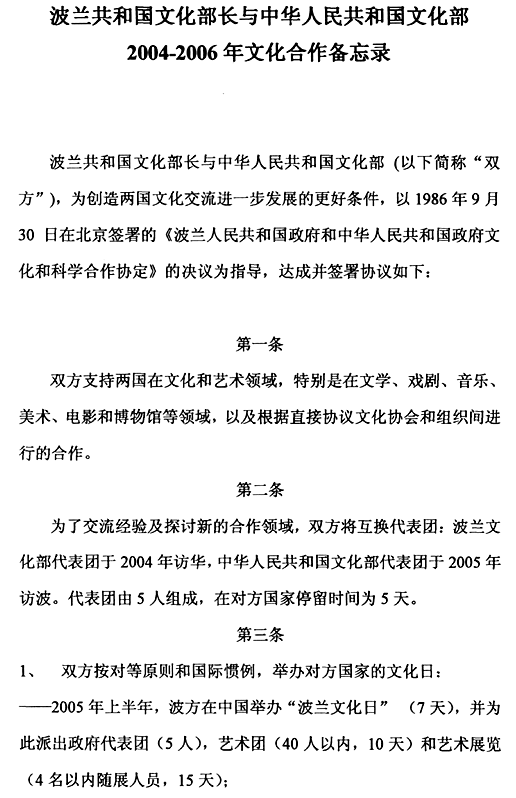
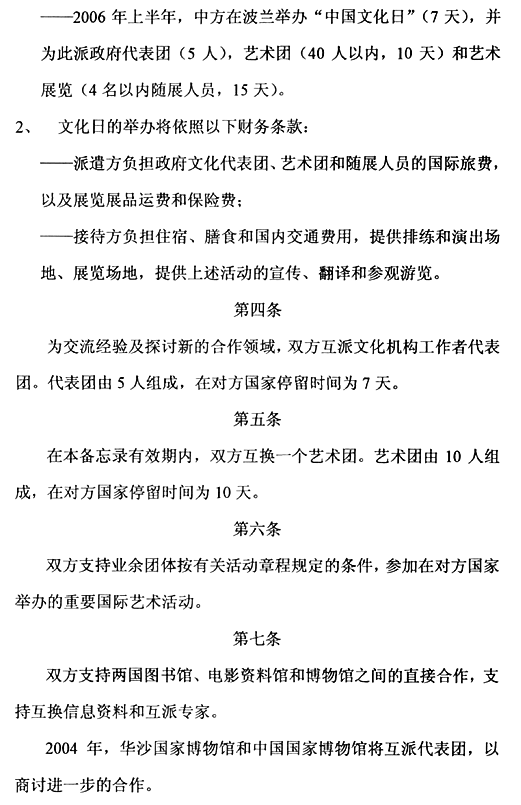
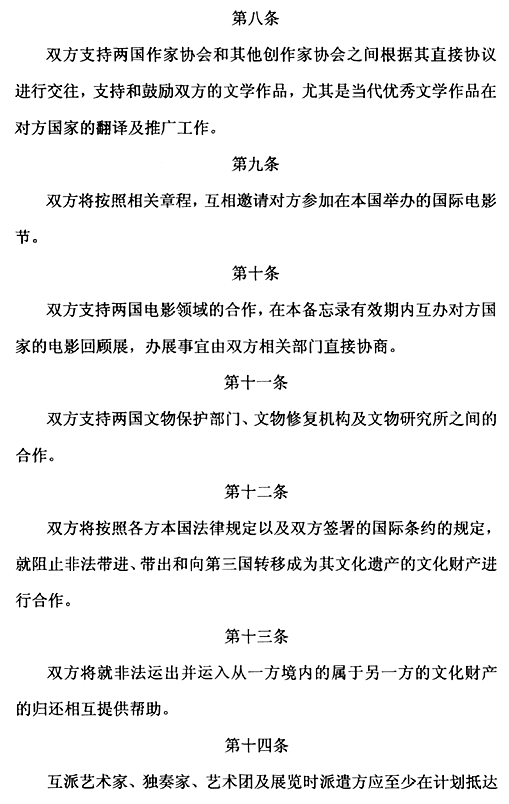
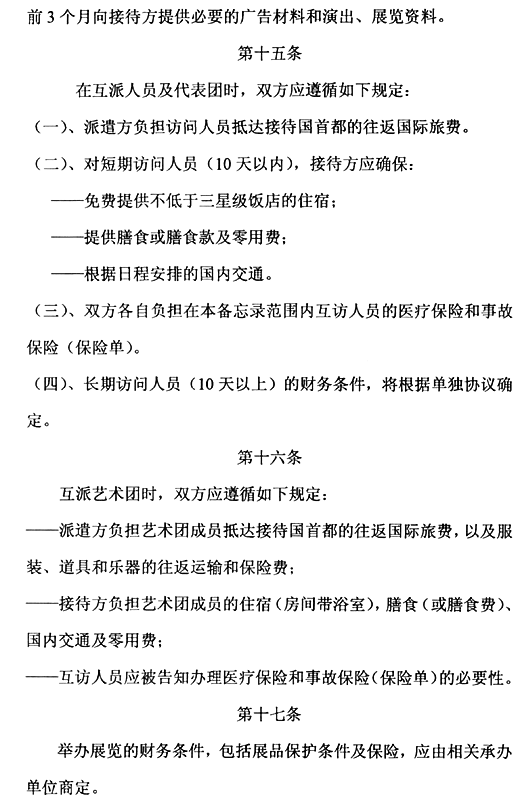
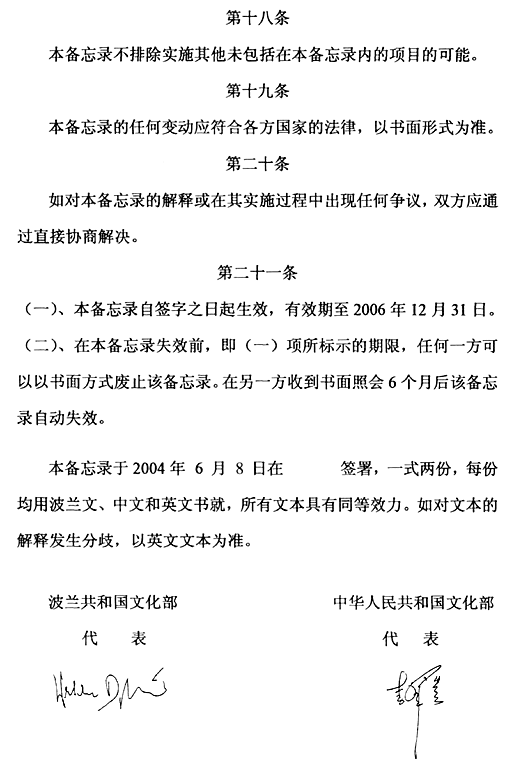
- Data ogłoszenia: 2004-12-15
- Data wejścia w życie: 2004-06-08
- Data obowiązywania: 2004-06-08
- Dokument traci ważność: 2006-12-31
REKLAMA
Monitor Polski
REKLAMA
REKLAMA





